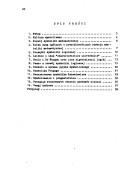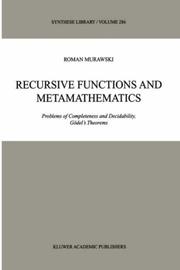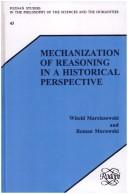| Listing 1 - 10 of 24 | << page >> |
Sort by
|
Book
ISBN: 3034808313 3034808305 1322133549 Year: 2014 Publisher: Basel : Springer Basel : Imprint: Birkhäuser,
Abstract | Keywords | Export | Availability | Bookmark
 Loading...
Loading...Choose an application
- Reference Manager
- EndNote
- RefWorks (Direct export to RefWorks)
The aim of this book is to present and analyze philosophical conceptions concerning mathematics and logic as formulated by Polish logicians, mathematicians and philosophers in the 1920s and 1930s. It was a remarkable period in the history of Polish science, in particular in the history of Polish logic and mathematics. Therefore, it is justified to ask whether and to what extent the development of logic and mathematics was accompanied by a philosophical reflection. We try to answer those questions by analyzing both works of Polish logicians and mathematicians who have a philosophical temperament as well as their research practice. Works and philosophical views of the following Polish scientists will be analyzed: Wacław Sierpiński, Zygmunt Janiszewski, Stefan Mazurkiewicz, Stefan Banach Hugo Steinhaus, Eustachy Żylińsk and Leon Chwistek, Jan Łukasiewicz, Zygmunt Zawirski, Stanisław Leśniewski, Tadeusz Kotarbiński, Kazimierz Ajdukiewicz, Alfred Tarski, Andrzej Mostowski and Henryk Mehlberg, Jan Sleszyński, Stanisław Zaremba and Witold Wilkosz. To indicate the background of scientists being active in the 1920s and 1930s we consider in Chapter 1 some predecessors, in particular: Jan Śniadecki, Józef Maria Hoene-Wroński, Samuel Dickstein and Edward Stamm.
Mathematics --- Logic --- History --- Philosophy. --- Logic of mathematics --- Mathematics, Logic of --- Argumentation --- Deduction (Logic) --- Deductive logic --- Dialectic (Logic) --- Logic, Deductive --- Intellect --- Philosophy --- Psychology --- Science --- Reasoning --- Thought and thinking --- Math --- Methodology --- Logic, Symbolic and mathematical. --- Philosophy (General). --- Logic. --- Mathematical Logic and Foundations. --- History of Mathematical Sciences. --- History of Philosophy. --- Algebra of logic --- Logic, Universal --- Mathematical logic --- Symbolic and mathematical logic --- Symbolic logic --- Algebra, Abstract --- Metamathematics --- Set theory --- Syllogism --- Mathematical logic. --- Mathematics. --- History. --- Mental philosophy --- Humanities --- Annals --- Auxiliary sciences of history
Book
ISBN: 9789042030909 9789042030916 Year: 2010 Volume: 98 Publisher: Amsterdam ;New York, NY Rodopi
Abstract | Keywords | Export | Availability | Bookmark
 Loading...
Loading...Choose an application
- Reference Manager
- EndNote
- RefWorks (Direct export to RefWorks)
Mathematics --- Logic --- Logic, Symbolic and mathematical. --- Philosophy. --- Philosophy --- History --- History. --- Cantor, Georg, --- Hilbert, David, --- Hoene-Wroński, Józef Maria, --- Logic, Symbolic and mathematical --- Math --- Science --- Logic of mathematics --- Mathematics, Logic of --- Algebra of logic --- Logic, Universal --- Mathematical logic --- Symbolic and mathematical logic --- Symbolic logic --- Algebra, Abstract --- Metamathematics --- Set theory --- Syllogism --- Hoene-Wroński, Józef Maria, --- Wroński, Józef Maria Hoene-, --- Gilʹbert, D., --- Hilbert, D. --- 希爾伯特, --- Mathématiques --- Logique --- Fondements --- Philosophie

ISSN: 05516625 ISBN: 8323201463 Year: 1988 Publisher: Poznan Uniwersytet im. Adama Mickiewicza w Poznaniu
Abstract | Keywords | Export | Availability | Bookmark
 Loading...
Loading...Choose an application
- Reference Manager
- EndNote
- RefWorks (Direct export to RefWorks)
Logique mathématique --- Logique mathématique --- Histoire des mathematiques
Book
ISSN: 00834246 Year: 1986 Publisher: Poznañ Wydawnictwo naukowe UAM
Abstract | Keywords | Export | Availability | Bookmark
 Loading...
Loading...Choose an application
- Reference Manager
- EndNote
- RefWorks (Direct export to RefWorks)
Digital
ISBN: 9783034808316 Year: 2014 Publisher: Basel Springer, Imprint: Birkhäuser
Abstract | Keywords | Export | Availability | Bookmark
 Loading...
Loading...Choose an application
- Reference Manager
- EndNote
- RefWorks (Direct export to RefWorks)
The aim of this book is to present and analyze philosophical conceptions concerning mathematics and logic as formulated by Polish logicians, mathematicians and philosophers in the 1920s and 1930s. It was a remarkable period in the history of Polish science, in particular in the history of Polish logic and mathematics. Therefore, it is justified to ask whether and to what extent the development of logic and mathematics was accompanied by a philosophical reflection. We try to answer those questions by analyzing both works of Polish logicians and mathematicians who have a philosophical temperament as well as their research practice. Works and philosophical views of the following Polish scientists will be analyzed: Wacław Sierpiński, Zygmunt Janiszewski, Stefan Mazurkiewicz, Stefan Banach Hugo Steinhaus, Eustachy Żylińsk and Leon Chwistek, Jan Łukasiewicz, Zygmunt Zawirski, Stanisław Leśniewski, Tadeusz Kotarbiński, Kazimierz Ajdukiewicz, Alfred Tarski, Andrzej Mostowski and Henryk Mehlberg, Jan Sleszyński, Stanisław Zaremba and Witold Wilkosz. To indicate the background of scientists being active in the 1920s and 1930s we consider in Chapter 1 some predecessors, in particular: Jan Śniadecki, Józef Maria Hoene-Wroński, Samuel Dickstein and Edward Stamm.
Philosophy --- Mathematical logic --- Logic --- History of philosophy --- Mathematics --- filosofie --- geschiedenis --- wiskunde --- logica --- anno 1920-1929 --- anno 1930-1939 --- Poland

ISBN: 0792359046 Year: 1999 Publisher: Dordrecht Kluwer
Abstract | Keywords | Export | Availability | Bookmark
 Loading...
Loading...Choose an application
- Reference Manager
- EndNote
- RefWorks (Direct export to RefWorks)

ISBN: 9051837909 9789051837902 9789004457423 9004457429 Year: 1995 Volume: 43 Publisher: Leiden : BRILL,
Abstract | Keywords | Export | Availability | Bookmark
 Loading...
Loading...Choose an application
- Reference Manager
- EndNote
- RefWorks (Direct export to RefWorks)
This volume is written jointly by Witold Marciszewski, who contributed the introductory and the three subsequent chapters, and Roman Murawski who is the author of the next ones - those concerned with the 19th century and the modern inquiries into formalization, algebraization and mechanization of reasonings. Besides the authors there are other persons, as well as institutions, to whom the book owes its coming into being. The study which resulted in this volume was carried out in the Historical Section of the research project Logical Systems and Algorithms for Automatic Testing of Reasoning, 1986-1990, in which participated nine Polish universities; the project was coordinated by the Department of Logic, Methodology and Philosophy of Science of the Bialystok Branch of the University of Warsaw, and supported by the Ministry of Education some of its results are reported in Srzednicki Ed. 1987. The major part of the project was focussed on the software for computer-aided theorem proving called Mizar MSE Multi-Sorted first-order logic with Equality, reported in Marciszewski 1994a due to Dr. Andrzej Trybulec. He and other colleagues deserve a grateful mention for a hands-on experience and theoretical stimulants owed to their collaboration.
Book
ISBN: 3110470772 3110468336 9783110468335 9783110468304 3110468301 9783110470772 Year: 2018 Publisher: Berlin ; Boston : De Gruyter,
Abstract | Keywords | Export | Availability | Bookmark
 Loading...
Loading...Choose an application
- Reference Manager
- EndNote
- RefWorks (Direct export to RefWorks)
The present book is an introduction to the philosophy of mathematics. It asks philosophical questions concerning fundamental concepts, constructions and methods - this is done from the standpoint of mathematical research and teaching. It looks for answers both in mathematics and in the philosophy of mathematics from their beginnings till today. The reference point of the considerations is the introducing of the reals in the 19th century that marked an epochal turn in the foundations of mathematics. In the book problems connected with the concept of a number, with the infinity, the continuum and the infinitely small, with the applicability of mathematics as well as with sets, logic, provability and truth and with the axiomatic approach to mathematics are considered. In Chapter 6 the meaning of infinitesimals to mathematics and to the elements of analysis is presented. The authors of the present book are mathematicians. Their aim is to introduce mathematicians and teachers of mathematics as well as students into the philosophy of mathematics. The book is suitable also for professional philosophers as well as for students of philosophy, just because it approaches philosophy from the side of mathematics. The knowledge of mathematics needed to understand the text is elementary. Reports on historical conceptions. Thinking about today's mathematical doing and thinking. Recent developments. Based on the third, revised German edition. For mathematicians - students, teachers, researchers and lecturers - and readersinterested in mathematics and philosophy. Contents On the way to the reals On the history of the philosophy of mathematics On fundamental questions of the philosophy of mathematics Sets and set theories Axiomatic approach and logic Thinking and calculating infinitesimally - First nonstandard steps Retrospection
Mathematics --- Logic of mathematics --- Mathematics, Logic of --- Philosophy.
Book
ISBN: 1283856638 9783110264630 3110264633 9781283856638 9783110262919 3110262916 9783119167642 3119167649 Year: 2012 Publisher: Berlin ; Boston : De Gruyter,
Abstract | Keywords | Export | Availability | Bookmark
 Loading...
Loading...Choose an application
- Reference Manager
- EndNote
- RefWorks (Direct export to RefWorks)
Dieses Werk gibt eine Einführung in philosophische Probleme und Hintergründe des mathematischen Denkens und Sprechens, Lehrens und Lernens. Es wendet sich an Lehrende und Studierende der Mathematik und Philosophie. Ausgangspunkt und immer wieder Bezugspunkt sind die reellen Zahlen. In pointierterWeise werden mathematische und philosophische Probleme und Fragen vermerkt, die sich auf dem Weg zu ihnen stellen. Ein umfangreicher Abriss von Auffassungen aus der Geschichte der Mathematik und Philosophie bis hin zu aktuellen Strömungen bildet den Hintergrund für ihre Diskussion. Kapitel über Mengenlehre, Logik und Axiomatik, über ungelöste und unlösbare Probleme und fundamentale Ergebnisse schließen sich an. Ein Rückblick schließt den Text ab. Die Erweiterung der zweiten Auflage betrifft im Kern drei Themen: Die Differenz zwischen Wahrheit und Beweisbarkeit, das philosophische Problem der Anwendbarkeit der Mathematik und den Begriff des Kontinuums. Sie führte zu einer Überarbeitung weiter Teile des Buches. Der Rückblick ist neu geschrieben. Die Autoren Thomas Bedürftig (Leibniz Universität Hannover) und Roman Murawski (Adam Mickiewicz Universität Poznan) sind Mathematiker mit den Forschungsgebieten Philosophie, Geschichte und Grundlagen der Mathematik, Mathematikdidaktik und mathematische Logik. This elementary introduction to philosophical problems and issues in mathematical thought, speech, teaching, and learning is now available in a revised and expanded second edition. It is designed for teachers and students of mathematics and philosophy alike. Real numbers form the basis for discussion and remain a continuous touchstone throughout the work, which incisively addresses a range of mathematical and philosophical problems and questions. The work provides an overview and engages in an in-depth discussion of viewpoints held throughout the history of mathematics and philosophy up to the present day.
Mathematics --- Logic of mathematics --- Mathematics, Logic of --- Philosophy. --- Axiomatics. --- Logic. --- Mathematics. --- Set Theory.
Book
ISBN: 1282672959 9786612672958 3110220601 9783110220605 9783110190939 3110190931 Year: 2010 Publisher: Berlin ; New York : De Gruyter,
Abstract | Keywords | Export | Availability | Bookmark
 Loading...
Loading...Choose an application
- Reference Manager
- EndNote
- RefWorks (Direct export to RefWorks)
Dieses Werk gibt eine überwiegend elementare Einführung in philosophische Probleme und Hintergründe des mathematischen Denkens und Sprechens, Lehrens und Lernens. Sie wendet sich an Lehrende und Studierende der Mathematik und der Philosophie. Ausgangspunkt und immer wieder Bezugspunkt sind die reellen Zahlen. In pointierter Weise werden mathematische und philosophische Probleme und Fragen vermerkt, die sich auf dem Weg zu ihnen stellen. Ein umfangreicher Abriss von Auffassungen aus der Geschichte der Mathematik und der Philosophie bis hin zu aktuellen Strömungen bildet den Hintergrund für ihre eingehende Diskussion. Kapitel über Mengenlehre, Logik und Axiomatik, über ungelöste und unlösbare Probleme und fundamentale Ergebnisse schließen den Text ab.
Mathematics --- Mathematics. --- Philosophy. --- Axiomatics. --- Logic. --- Set Theory.
| Listing 1 - 10 of 24 | << page >> |
Sort by
|

 Search
Search Feedback
Feedback About UniCat
About UniCat  Help
Help News
News